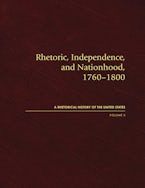Few periods of American history have been studied more extensively or debated more intensely than the last four decades of the eighteenth century, during which the thirteen colonies declared their independence from Great Britain, won their independence on the battlefield, created the United States Constitution, and implemented a new national government. Scholars have approached these developments from a variety of perspectives—economic, social, political, religious, legal, and diplomatic, to name a few. This volume adopts a rhetorical perspective, which foregrounds the art of effective expression as a means of influencing political perceptions, values, and behaviors. It presents eleven essays by an interdisciplinary group of scholars who bring to bear a variety of methods, backgrounds, perspectives, and specializations. The essays illuminate key rhetors, works, controversies, and moments that helped shape American discourse and politics during the years 1760–1800.
ContentsAcknowledgmentsIntroduction: Rhetoric, Independence, and Nationhood, 1760–1800 | Stephen E. Lucas1. The Child Independence Is Born: James Otis and Writs of Assistance | James M. Farrell2. Spectacular Words: The Boston Massacre Orations, Standing Armies, and the Transformation of Civic Identity | Stephen Howard Browne3. Religion, Rhetoric, and Revolution: The Preaching of New England’s Whig Clergy | Christopher Grasso4. The Commonalities of Common Sense | Robert A. Ferguson5. Justifying America: The Rhetorical Artistry of the Declaration of Independence | Stephen E. Lucas6. Loyalist Discourse and the Moderation of the American Revolution | Timothy M. Barnes and Robert M. Calhoon7. The Confounded Rhetorics of Race in Revolutionary America | Stephen John Hartnett and Michael William Pfau8. Revolutionary Sensibility: The Civic Rhetoric of American Women, 1760–1800 | Sandra M. Gustafson9. The Rhetoric of The Federalist: On the Symbolic Economy of Power in the United States | Jeremy Engels10. Alexander Hamilton’s National Blessing: A Rhetorical Study of the Report on Public Credit | John M. Murphy11. Naming Americans: Benjamin Rush and the Invention of Citizenship in the Early Republic | Greg GoodaleBibliographyAbout the AuthorsIndex

